AI-generated content is fast and inexpensive, but let’s face it – it cannot replace a human writer. This is why there are AI content checkers to make sure the content is written by a human and not AI.
And that’s where Originality.ai comes in. It’s an AI checker that also detects plagiarism and factual inaccuracies.
So, when you pay someone to get something written, this tool will check how much effort actually went into it. It’s a tool designed mainly for web publishers and educators.
Originality AI boasts of being the number one AI detector in the market. In this review, I’ll test whether it’s worth its salt or not.
Quick Verdict
Originiality.ai is designed to check if a given piece of text is written by a human or AI. Apart from that, it also checks for plagiarism and factual errors.
In short, it checks whether the content flows well, is meant for human readers, is factually correct, and not copied from other sources.
Originality is primarily meant for English content but it’s also available for other languages such as Russian, Spanish, French, and Italian.
The platform is easy to use and provides a readability score to let you know if the content is easy on the eyes. When you want to know if your content is high quality, pass it through Originality.ai and it will tell you.
Key Takeaways
- Originality uses advanced machine learning to detect whether the given content is human-written or AI-generated.
- It also checks for duplication and plagiarism to maintain work integrity.
- Originality checks for tone and readability and gives an overall quality score to the content. It also offers improvement suggestions.
- It has a user-friendly interface and it offers easily understandable results.
- It ensures that your content is clear and concise and future-proofs your website by ensuring it’s human-written.
- It gives a readability score to the content to let you know how naturally flowing it is.
- Originality offers APIs so developers can integrate it into their applications.
- Its team management capabilities let you add or remove team members and manage their access levels.
How I Tested the Product
For this review, I tested Originality with one piece of content that’s completely AI-written. Then I used text 100% written by me and ran it through two different models on the platform.
I wrote about a childhood experience so it’s a personal piece and hasn’t been already done on the internet.
I have discussed these two tests and shown screenshots in the article.
And then I tested the same content on another AI detector to compare the results.
I have discussed my analysis of the tool in the article. But before that, let’s discuss some pros and cons of Originality AI.
Pros
- Very easy to use with a simple interface
- Flexible pricing – buy a subscription or credits
- Checks for AI-generated content
- Detects plagiarism to see if the content is copied from the internet
- Checks for factual accuracy
- Gives a readability score to see if the content flows easily
Cons
- Can be inaccurate when checking human content
- Doesn’t offer a full free version to test all its capabilities
What is Originality AI
Originality.ai is an online tool that checks for the presence of AI in your content. While generating content with the help of AI is super easy and fast, it has some drawbacks.

For starters, AI-written content doesn’t flow naturally. Yes, some advanced language models like GPT-4 are among the best, but they also leave many clear giveaways that the content is AI-generated.
Secondly, human-written content will give you a future-proof website. There are chances that Google will give a higher ranking to human-written content in the future.
So if your website has AI-generated content, it might rank high now but could lose balance in the coming days.
The solution?
Get a human for the job.
A human writer will create content that sounds more natural, is factually accurate, and is free of plagiarism. But what if you pay someone for the job and they take help from AI?
You get your private detective – Originality.ai. It will fact-check the content to see if it’s properly researched.
Plus, its plagiarism detector will check if it’s copied from anywhere on the internet. And most importantly, it will check if the content is indeed written by a human.
And apart from these services, it will also give the content a readability score to see if it flows naturally.
Pricing
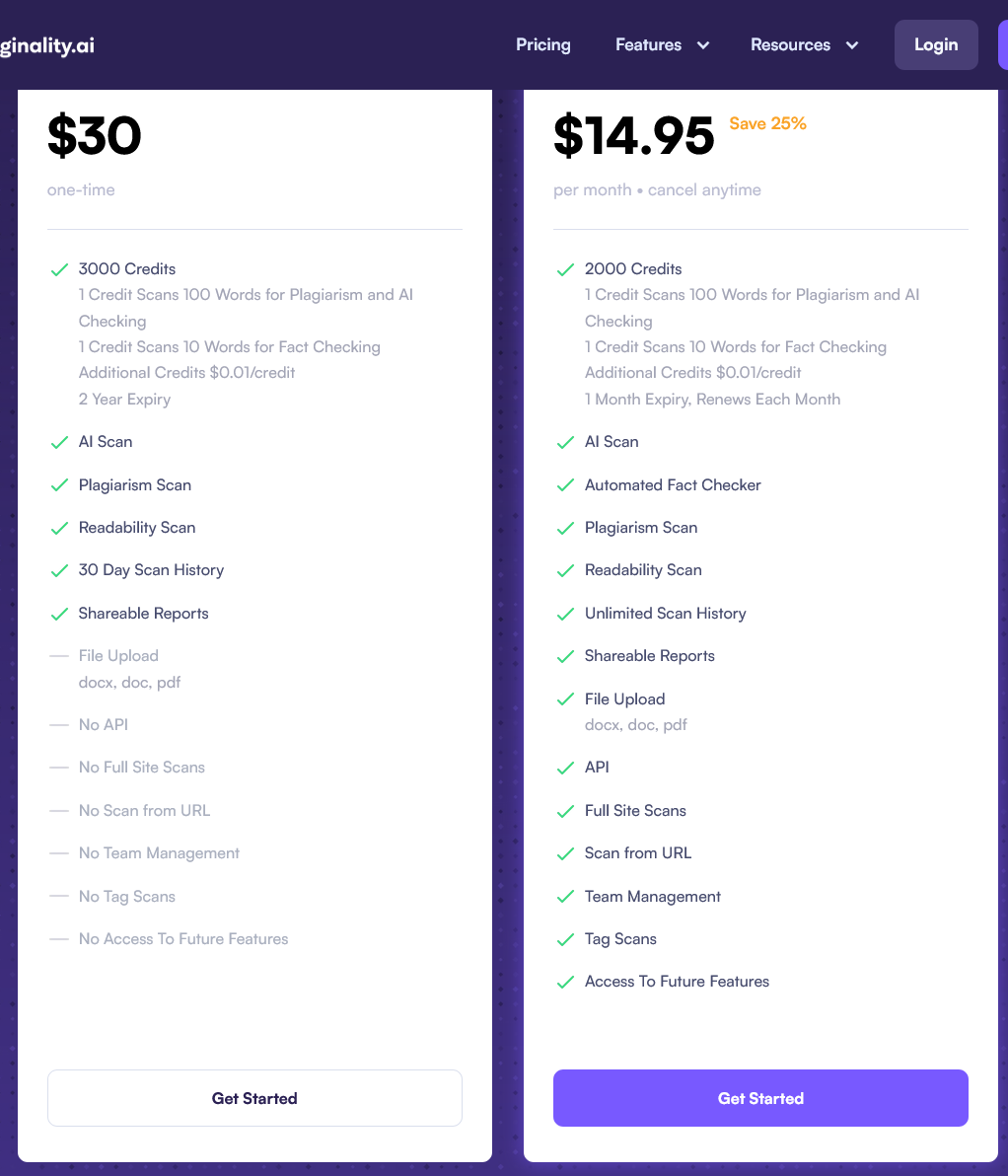
Originality has flexible pricing plans. You can either get a Pay-as-you-go plan for $30. It will give you 3000 credits. Or you can get a monthly subscription for $14.95/month with 2000 credits each month.
How Does Originality AI Work?
Originality.ai is based on the Bidirectional Encoder Representations from Transformers (BERT) model. This model processes natural language.
The model used by Originality has a more flexible architecture than the model used by generative tools. This gives it powerful detection abilities.
The training dataset of Originality is generated by several sampling methods and is reviewed by humans.
It uses advanced machine learning to see if the content is generated by AI. The same algorithm also helps it understand if the content flows naturally. If it does, it gets a good readability score.
The model works on the probability of a text being AI-generated. It defines Accuracy as the Number of Correct Predictions divided by the Total Number of Observations.
In layman’s terms, Originality words by scanning the text you upload and comparing it to a huge database of online resources such as web pages, blog posts, academic papers, and other sources to check for plagiarism.
The company boasts of 99% accuracy on GPT-4, 83% on ChatGPT, and about 2% false positives. Is this true? Let’s test the platform and see.
Using Originality AI
Let’s test the tool to see how it performs.
1. Sign Up
Use the Sign Up button given on the top right of the screen.
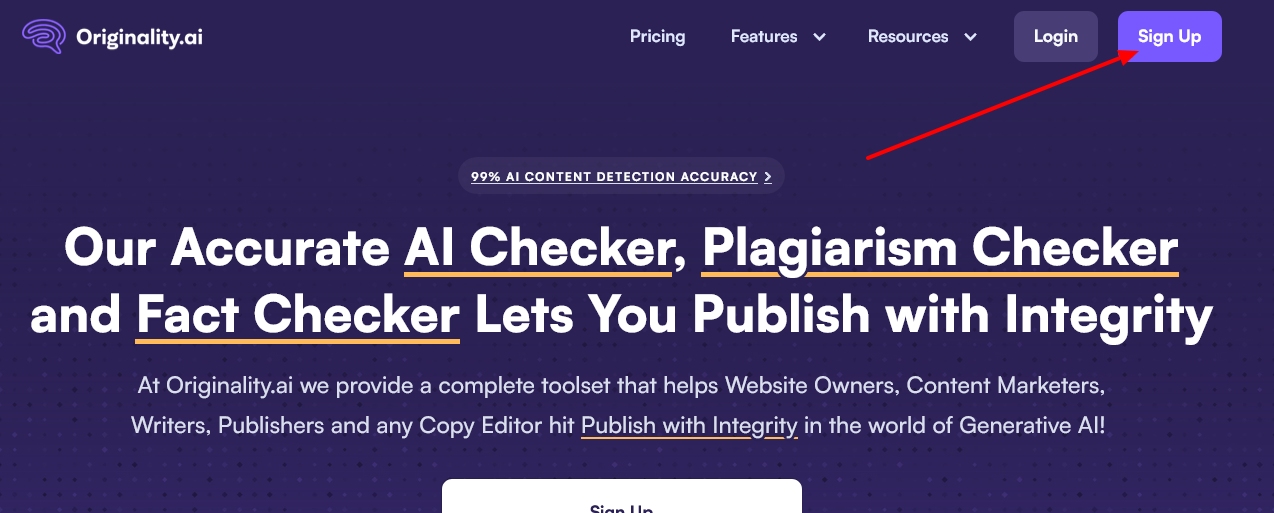
Once you create a new user, it will send you a verification email. As soon as you verify the email address, you will get an initial balance of 50 credits.
2. Open the Dashboard
After creating an account and verifying the email link, use the Login button to log into their system and it will take you to the dashboard.
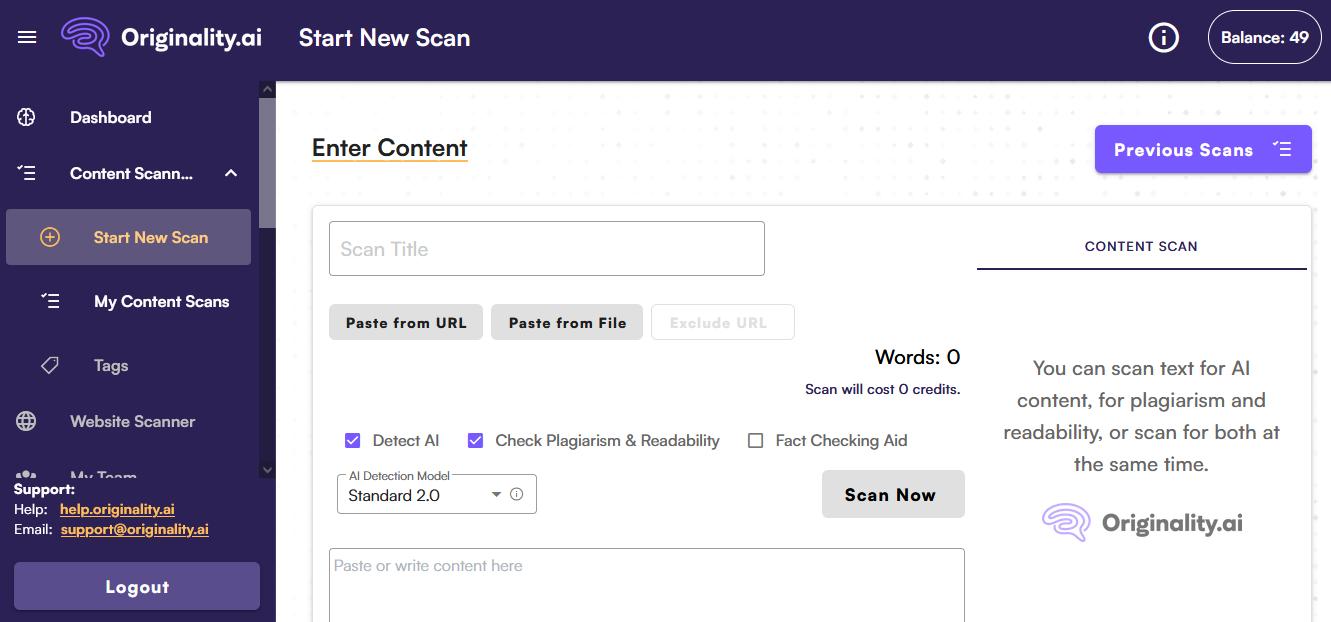
Your credit balance will show in the top right corner.
3. Copy and Paste content
Let’s try the tool. I generated some text from ChatGPT. I’ll check how it performs on Originality. I selected the Turbo 3.0 model for this experiment.
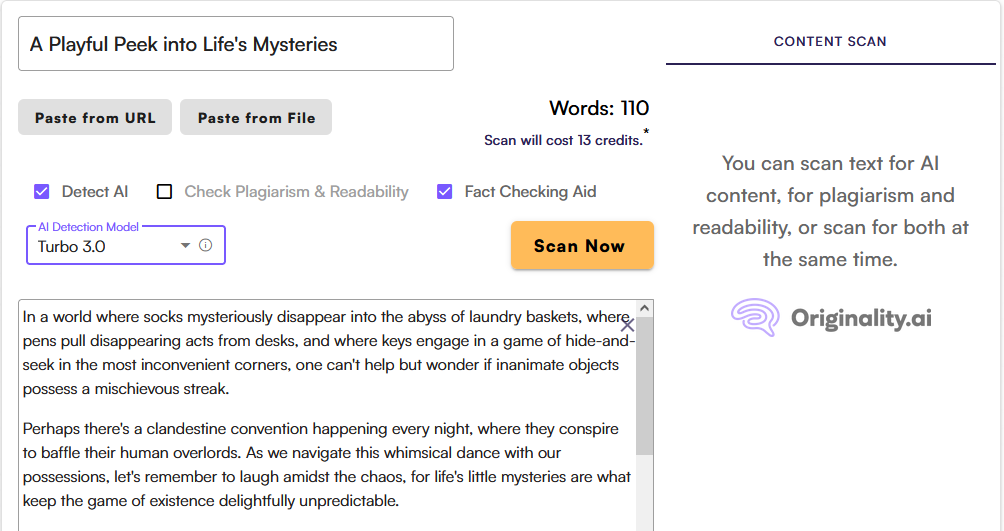
And here’s the result.

This one is true. It was absolutely 100% AI.
Apart from using the dashboard of Originality, you can also download its Chrome extension and use it to scan content on the go.
Here’s how you can use the Chrome Extension
1. Visit the Google Chrome Web Store.

2. In the search bar, enter Originality AI. It will show you matching options.

3. Select the first choice from the list. The Originality Chrome web store page will open up. Click on Add to Chrome.

Once it’s done, you’ll see that Originality AI has been added to your extensions bar in the browser. Log into it with your email and password.
The next time you open a website, you’ll see the Originality button on it.

Click on it and it will open a panel.
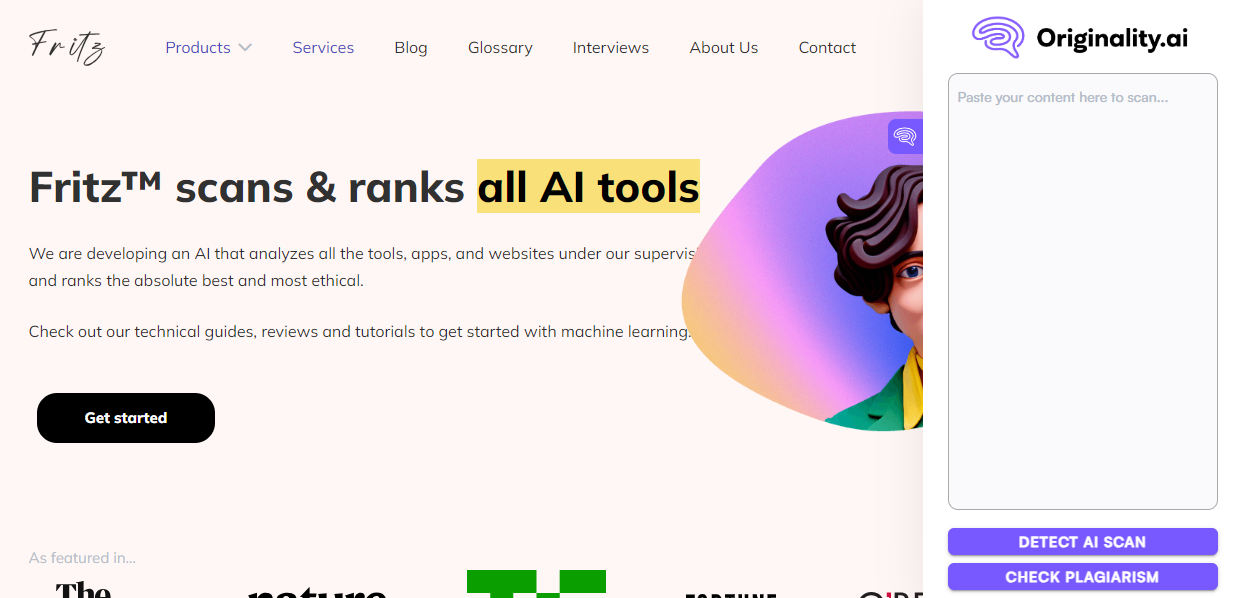
You can enter your text in the given box and click on Detect AI Scan or Check Plagiarism depending on your needs.
That’s the essence of using Originality. Let’s go into more details to check the accuracy of the platform.
Detailed Reviews and Tests
I checked 100% AI-generated text and it gave the correct result in the above example.
But what if I used a piece of text written by me (100% human-generated content)?
I wrote a couple of paragraphs and put them in the detector to see how it performs now.

Here’s the score:
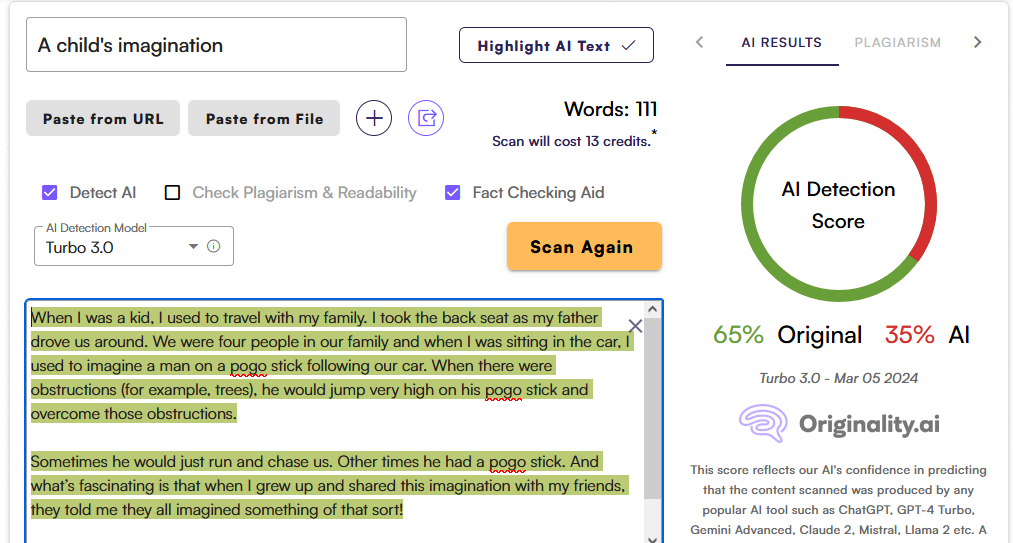
I got a 65% score on this content with the Turbo 3.0 model.
That’s far from accurate. It’s surprising, especially since it was an original topic and not something that has been discussed several times on the internet.
I ran the test again and this time, I used the Standard 2.0 engine. I got a 71% score this time.
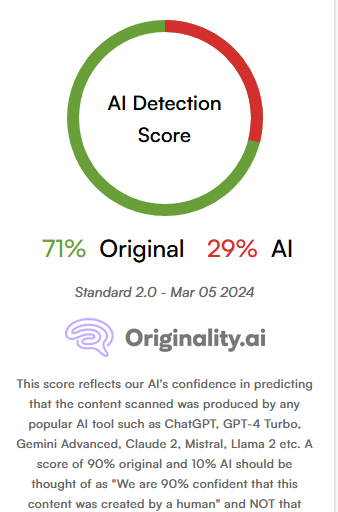
This is better than the 65% I got with the Turbo 3.0 engine. However, it’s still not accurate.
Based on these tests, I can say that the results can be misleading and give a wrong judgment call. I ran a couple of more tests and noticed that Originality identifies text as AI-generated even when it’s not.
But wait, how well do other tools perform?
Let’s compare it with another AI detection tool. I ran the same text through Winston.
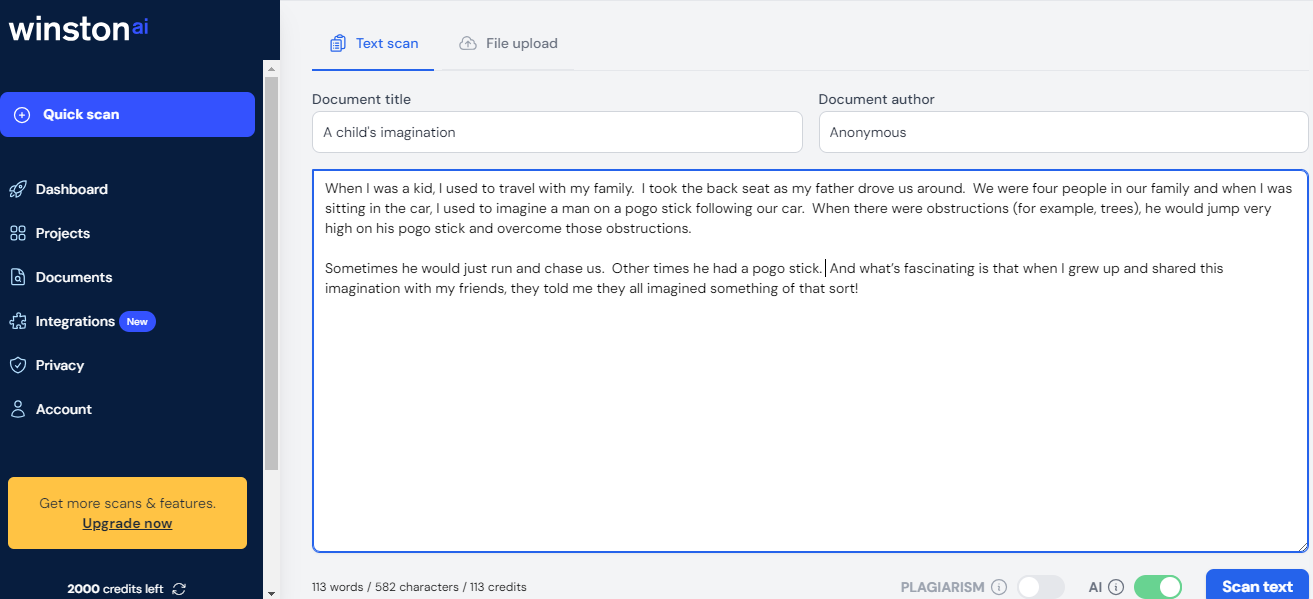
These were the results I got.

This is far more accurate than Originality. My text was completely written by me and Winston gave it a 91% score, as against the 65% I got on Originality.
I won’t say Originality AI is completely unusable. It did give the original content a better score than the one generated by AI.
As artificial intelligence technology progresses and we see more AI-based content generators, there’s a need for AI detectors to find human-written content.
However, Originality AI isn’t that accurate. For now. As its engine evolves, we might see better results. For a more accurate analysis, I would recommend the Standard 2.0 model instead of Turbo 3.0.
Is Originality AI Legit?
I went through user reviews and saw that many people complained that Originality AI is a scam. But is it? I ran several tests to check the accuracy of the tool and I found that Originality is definitely legit.
It has accuracy problems, especially with its Turbo 3.0 engine which is very harsh and marks human content as AI-generated. But it does detect the presence of human-generated content. It’s definitely not a scam.
If you’re a web publisher and want to check the work of your writers using Originality, I’d recommend the Standard 2.0 model, which is also not very accurate, but it’s still better than Turbo 3.0.
User Reviews
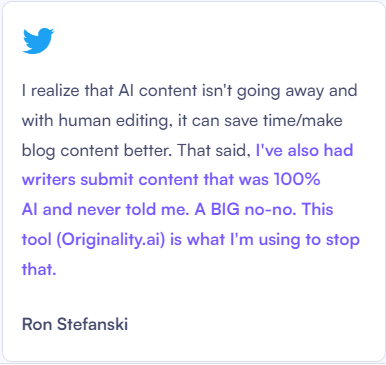
I checked online review sites and platforms like Reddit to see what other people are saying about Originality.
What I saw were mixed reviews. While some marketers were swearing by Originality, others thought that the tool came up with random numbers for readability scores.
Most people complained that it flagged human-written content as AI-generated. Some writers had problems with their clients because their human-written content was assumed to be AI-generated.
The main problem with the current version of Originality is that it gives too many false positives.
On the positive side, they have an amazing customer support team. I tested their service by sending them an email about a feature and they mailed me back in just a couple of hours. They were able to solve my problem about a feature and I’m happy with that.
Some users reported that their 2.0 model gave better results than the 3.0 model. I also found the same in my tests.
And then some users complained that Originality is a scam. I don’t agree with this because it did show different results between the AI-generated and human-written content. I feel that the company’s AI engine needs to evolve more to detect AI-generated content.
How are Writers and Publishers Affected by Originality AI
There are many AI content generation tools and AI copywriting software. While these tools produce amazing content, an experienced reader (or an AI detector) can always tell when the content is generated by AI.
As Google algorithms evolve, there are chances that it may penalize AI-generated content. Currently, it does not.
But with so many AI tools, many blogs and websites are coming up with content that gets written in just under a minute.
To weed out outdated content, Google might launch an update that gives more value to human-written content. This is why future-centric companies want authentic human content.
Companies approach writers to create content but how can they be sure that the writer they hire gives them authentic content?
This is why many of them use AI detectors. Originality AI is one of them.
Its performance affects writers and publishers. A false positive can make a writer’s work come under suspicion. A hardworking writer might find it difficult to prove their worth when an AI detector marks their content as AI-generated.
On the other hand, a false negative can adversely affect the publisher. An unethical writer may try to pass off AI-generated content as their own.
If the content checker doesn’t flag it as AI-generated, it might affect the SEO ranking of the website.
Let’s take another example:
A student is supposed to write his thesis on a given subject. He spends days researching and writing it. Once finished, he emails it to his professor.
The professor uses an AI detector to check if the thesis is indeed written by the student.
The AI checker gives a false positive and labels the thesis as AI-generated. The professor either fails the student or asks him to write the thesis again.
Either way, his hard work will go kaput. And even if he does get time for another thesis, what are the chances that the next thesis will not be wrongly flagged?
It’s a tricky situation. While AI detectors are made to make life simpler for publishers, inaccurate results can lead to many new problems.
To avoid such situations, keep in mind that AI detectors also run on AI and can occasionally fail. There are other AI detectors in the market, but presently, there is no detector that gives 100% accurate results.
Until we get such a tool, you can use AI detectors but make sure you also depend on your own judgement and logical understanding.
If a certain piece of content flows well and looks like it’s written by a human, it probably is.
Originality AI Alternatives
Let’s discuss some other AI detector tools out there.
Copyleaks

Copyleaks is an AI content detector that finds out if a given piece of content is human-written or AI-generated. It also checks for plagiarism to see if the text is copied and pasted from another online source.
It has a feature called Codeleaks that detects plagiarized or AI-generated code. It helps you know your code so you don’t have proprietary concerns. It also has an assessment grader that can grade a high volume of standardized tests.
This gives faster and more accurate grades to students and improves efficiency.
Copyleaks comes with a writing assistant that will help you check for grammatical mistakes and improve your sentence structure.
Winston

Winston checks for AI content generated by AI tools built on top of GPT-4, Gemini, and others. It claims to have an accuracy rate of 99.98% and is suitable for writers, educators, and web publishers.
Just like Originality, it also comes with a plagiarism checker and offers a readability score to your text. Apart from that, it also has a word counter that counts words, characters, sentences, and syllables.
It has an easy-to-use dashboard and a Chrome plugin, pretty much like Originality. Winston is cheaper than Originality and also comes with a free plan that doesn’t need a credit card. It offers APIs that work in multiple languages.
GPTZero

GPTZero uses deep analysis to test whether a given piece of content is AI-generated or written by a human. Like other AI-detection tools, it also checks for plagiarism.
It works on a high volume of data, so instead of copying and pasting paragraphs, you can scan dozens of files to it and download reports.
It tests content to see if it’s been written by GPT-3, GPT-4, Bard, LLaMa, and other models. GPTZero offers APIs to developers so they can integrate AI detection capabilities in their applications.
You can use the GPTZero dashboard or download its Chrome extension to test content from your browser. Like Winston, GPTZero also offers a free plan.
Conclusion
Originality AI is an AI detection tool that has the scope to become large. It claims to have a 99% accuracy rate and carries features such as plagiarism detection and fact checking.
However, in my tests, I found that it leaves much to desire.
While Originality AI’s user-friendly interface makes it a convenient option for improving content quality, it’s important to note that its accuracy is not always perfect.
As with many other AI-powered tools, Originality might make mistakes now and then. However, the platform’s developers are continuously working to improve its accuracy.

Comments 0 Responses